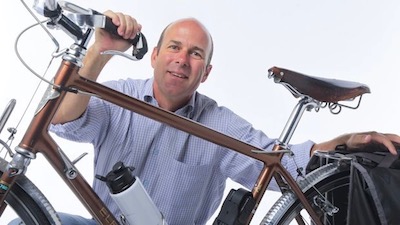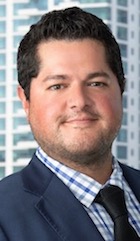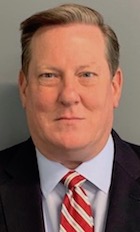Daily Business Report-June 6, 2019
The Old Point Loma Lighthouse at Cabrillo National Monument (Photo courtesy of the National Park Service)
Tourism to Cabrillo National Monument
creates $67.5 million in SD economic benefits
A new National Park Service (NPS) report shows that 842,000 visitors to Cabrillo National Monument in 2018 spent $49.7 million in communities near the park. That spending supported 654 jobs in the local area and had a cumulative benefit to the San Diego economy of $67.5 million.
“Cabrillo National Monument welcomes visitors from across the country and around the world,” said Superintendent Andrea Compton. “We are delighted to share the story of Juan Rodriguez Cabrillo’s journey and invite you to experience sweeping views of San Diego while you go on your own journey of exploration. National park tourism is a significant driver in the national economy, returning $10 for every $1 invested in the National Park Service, and tourism is a big factor in the San Diego economy as well. We appreciate the partnership and support of our neighbors and are glad to be able to give back by helping to sustain local communities.”
The peer-reviewed visitor spending analysis was conducted by economists Catherine Cullinane Thomas and Egan Cornachione of the U.S. Geological Survey and Lynne Koontz of the National Park Service. The report shows $20.2 billion of direct spending by more than 318 million park visitors in communities within 60 miles of a national park. This spending supported 329,000 jobs nationally; 268,000 of those jobs are found in these gateway communities. The cumulative benefit to the U.S. economy was $40.1 billion.
Lodging expenses account for the largest share of visitor spending, about $6.8 billion in 2018. Food expenses are the second largest spending area and visitors spent $4 billion in restaurants and bars and another $1.4 billion at grocery and convenience stores.
Visitor spending on lodging supported more than 58,000 jobs and more than 61,000 jobs in restaurants. Visitor spending in the recreation industries supported more than 28,000 jobs and spending in retail supported more than 20,000 jobs.
Report authors also produce an interactive tool that enables users to explore visitor spending, jobs, labor income, value added, and output effects by sector for national, state, and local economies. Users can also view year-by-year trend data. The interactive tool and report are available at the NPS Social Science Program webpage: https://www.nps.gov/subjects/socialscience/vse.htm
_____________
Goal Structured Solutions of San Diego
acquires Austin-based Skills Fund
San Diego-based Goal Structured Solutions has acquired Skills Fund, a financing platform for bootcamps and tech skill training schools, in an all-cash transaction. The sales price was not disclosed. Skills Fund, based in Austin, was founded in 2015. It previously raised $11.5 million in seed stage funding.
“We created Skills Fund four years ago with a simple premise: don’t finance students to go to crappy schools. We’ve delivered on that promise by underwriting the quality of education to ensure programs genuinely deliver career outcomes worth a student’s time and money,” Rick O’Donnell, Founder and CEO of Skills Fund, said in a news release. “Furthermore, student demand for lenders who focus on real outcomes is off the charts. By teaming up with Goal, we will have additional resources to serve even more students at a broader array of programs that deliver great outcomes.”
Skills Fund partners with more than 70 schools and 400 programs. It lends money to students participating in programs in software development, web development, data science, and cybersecurity
Goal is the largest third-party provider of student loan services and currently manages a portfolio of over $26 billion.
Skills Fund will operate as a wholly owned subsidiary of Goal, with the Skills Fund team continuing to be based out of Austin. O’Donnell and co-founder Joseph Kozusko will continue to lead the company.
_____________

Sudberry Properties starts construction
on 409,500-square-foot Otay River Business Park
Sudberry Properties has started construction on the 409,500-square-foot Otay River Business Park, a mixed-use industrial development on 50 acres less than a mile east of Interstate 5. The undeveloped site is bordered on the west by Broadway, on the north by Main Street, on the east by Fourth Avenue and on the south by the Otay Valley Regional Park.
Colton Sudberry, president of Sudberry Properties, which has developed approximately 12.6 million square feet of commercial and residential property with a market value exceeding $2.5 billion, said the multi-phase project will consist of seven industrial buildings ranging from 40,000 to 67,500 square feet and about 5,000 square feet of retail services, including a car wash and 7-Eleven.
The business park, which lies on the site of a former strawberry field and concrete plant, will be developed in phases over the next few years. First, the industrial and commercial areas will be developed; then the 13.9-acre City of Chula Vista public park. Approximately 6 acres is planned to be left as open space.
The development team includes SCA Architecture of San Diego, Lightfoot Planning Group of Carlsbad, and Ridge Landscape Architects (RLA) of Irvine. Sitework and grading are underway by Southland Paving Inc. Sudberry Properties is in the process of selecting the general contractor.
During the Chula Vista City Council meeting last year, the Otay River Business Park was heralded as the largest project in western Chula Vista, after the city’s Bayfront redevelopment projects. Chula Vista Senior Planer Miguel Tapia said that the business park will bring dozens of companies and significant revenue to the city.
Sudberry Properties will own and operate the Otay River Business Park. Michael Mossmer of Voit Real Estate Services is providing brokerage services.
_____________
City of San Diego appoints Andy Hanshaw
to lead new Mobility Board

The city of San Diego has appointed San Diego Bike Coalition Executive Director Andy Hanshaw to chair its new Mobility Board. As a local biking expert, Hanshaw plans to lead San Diego into a future with equitable transportation and increased mobility.
In his new role, Hanshaw aims to guide San Diego to reach the goals outlined in the City’s Climate Action Plan. He also will serve as the leading voice for bikes, urging the city to accelerate existing bike plans such as the Bike Master Plan and the Downtown Mobility Plan that connect bikeways in the city and offer safe routes for commuters.
“I’m happy the new Mobility Board is represented by people actively involved in biking, walking and transit,” Hanshaw said. “When we talk about mobility, it has to be about prioritizing everyone’s way to move about our city outside of a car. I trust our board will be effective with the city to influence better biking and other mobility changes.”
_____________

Kawhi Leonard tops May Stars
of the San Diego Sports Association
Before Kawhi Leonard was traded to Toronto, no team from outside the United States had advanced to the NBA Championships. With the ex-San Diego State All-American leading the way, the Raptors ended that streak. Leonard topped a list of 16 pros, amateurs and high school athletes earning May Stars of the Month honors as awarded by the San Diego Sports Association.
Joining Leonard as pros were San Diego Padres first baseman Eric Hosmer, San Diego Gulls standout Adam Cracknell and veteran Funny Car drag racer Ron Capps.
Leonard overaged 26.6 points and 7.3 rebounds in leading the Raptors to the Eastern Conference title and into the NBA Championships against the Golden State Warriors.
Hosmer batted .381 for the month, scoring 17 runs and driving in 15 to keep the young Padres above.500. Cracknell led the Gulls in the Calder Cup Playoffs with 16 points and Capps nabbed back-to-back races early in the NHRA Funny Car season.
On the amateur front, Cal State University San Marcos junior Jaime Jacob captured the school’s first Division II title with an even-par 219 at Palm Beach Gardens, helping the team to a second-place finish.
Joining her were UC San Diego track athletes Matt Bowen and Natalie Caraway; USD tennis standout Solymar Colling; Point Loma Nazarene track heptathlete Freda Kallenberg and San Diego City College state badminton champion Sum Yin Ngai.
State 400-meter run champion Katriina Wright of University City and state golf titlist Luke Potter of Torrey Pines led the high school honorees. They were joined by section tennis winner Michael Hao of Torrey Pines; section optional all-around champ Tessa Anderson of West Hills; Eastlake baseball pitcher Ricky Tibbett and Mater Dei Catholic softball catcher Alyssa Garcia.
_____________
SDSU launching tool to improve scholarship award rate
To improve the ease with which students are able to identify and receive scholarship funds, San Diego State University is partnering with Blackbaud Inc., to adopt a state-of-the-art, one-stop scholarship matching system.
Once fully integrated, the Blackbaud Award Management system – to be called the Aztec Scholarship Portal and slated for launch in March 2020 – will maximize scholarship opportunities for students. One significant benefit: qualified students will be matched to multiple scholarships through a single application.
“Many of our scholarships are designed to connect students with their passions and the experiences they want, whether related to academics, study abroad, service or career,” said SDSU President Adela de la Torre. “Our new enterprise system will simplify the scholarship search and application process for our students. It will also help to improve student retention and success while enhancing how we manage scholarship funds.”
Instead of applying to multiple scholarships individually, which has been the common practice, students will need only apply once to be auto-matched to different scholarships simultaneously.
“We are offering customizable solutions,” said SDSU Financial Aid and Scholarships Director Rose Pasenelli.
_____________

County gets state grant to help whack invasive weed
The county of San Diego has received a $53,966 state grant to continue efforts to corral a native plant-threatening, fire hazard-creating invasive weed that even Australian cows don’t like.
Ward’s weed has taken over rangelands in Australia and is threatening to invade North America starting in San Diego County, which is home to fragile ecological habitats like coastal sage scrub.
County Agriculture, Weights and Measures officials hope the two-year $53,966 grant from the California Department of Food and Agriculture will supplement existing funding and possibly push efforts forward—from suppressing the weed to eradicating it.
Ward’s weed made local news recently because groups are working to control the largest infestation in Carlsbad. However, the county and other agencies have been working to contain the weed for a few years.
_____________
Thinkful announces partnership
with University of San Diego
Thinkful, the online coding school that brings high-growth tech careers to people nationwide, announced a partnership with the University of San Diego (USD) Division of Professional and Continuing Education. This partnership offers the community access to job training and competitive career opportunities as software engineers and data scientists in the greater San Diego area.
Prospective students are welcome to apply now. To learn more about the program, visit https://codingbootcamp.sandiego.edu/. To find out more about Thinkful’s programs, student outcomes and job guarantee, visit Thinkful.com.
_____________
MUFG Union Bank gives $300,000
to fund business accelerator program
MUFG Union Bank announced its grant of $300,000 to help fund CONNECT ALL @ the Jacobs Center (CAJC), the region’s first diversity focused business accelerator program. Union Bank executives joined Mayor Kevin L. Faulconer and other special guests, as well as the first cohort of 13 local start-up companies, at a ribbon cutting, opening ceremony and tour of the new center.
A partnership between the City of San Diego, the Jacobs Center for Neighborhood Innovation and CONNECT, CAJC is geared specifically toward diverse and financially disadvantaged founders of San Diego-based, early-stage startups that are poised for growth and job creation.
Union Bank will provide an annual $100,000 contribution for three years to CAJC to help it reach its goal of providing opportunity for low-to-moderate income and diversity focused entrepreneurship and spurring economic development in San Diego including in historically underserved communities.
Companies accepted into the CAJC business accelerator will participate in a six-month program tailored to support their various needs, including expert mentors, opportunities to access capital, and free co-working space complete with office equipment, such as high-speed internet and printers. All components of the program will be free to participants; no equity stake required. CAJC also offers a no-cost Business Resource Center foe Entrepreneurs at all levels.
_____________

Casinos fight to keep tax break
Matt Levin | CALmatters
Say you have a good night at the casino and win $10,000, only to have your luck run out the next night and lose $12,000.
You can deduct your losses against winnings and save yourself when state income taxes come due.
That could be seen as a loophole tailored for casinos that depend on high-rollers. But loopholes are in the eyes of the beneficiaries, as Assemblyman Adam Gray, a Democrat from Modesto, is finding. Gray, who chairs the committee that oversees gambling, is pushing legislation to eliminate the “net wagering losses” deduction.
Depending on how it’s viewed, that step would cost high-rollers $490 million or generate that amount for the state in the coming year, the Franchise Tax Board estimates.
Gray proposes to earmark the money to pay for a new University of California teaching hospital at UC Merced and at UC Riverside, and provide clean water for a million Californians who cannot safely drink from their taps. His bill awaits an Assembly vote.
The influential Tribal Alliance of Sovereign Indian Nations, which represents tribes that own casinos, is not pleased:
“Although seemingly popular, elimination of this deduction will have consequences–primarily on tribal governments–which we have not had the opportunity to adequately analyze given the absence of any meaningful consultation with Indian tribes.”
_____________
Personnel Announcements
Airport Authority names Michelle Brega
as senior director for external relations

The Airport Authority has selected Michelle Brega to fill the newly created role of senior director for external relations. In the role, Brega will be responsible for leading the Airport Authority’s public and community outreach, and government relations functions.
Brega brings deep experience in government and community relations, strategic communications, and economic development to her new role, as well as a robust network of contacts throughout the San Diego region and beyond.
Brega has strong ties to the San Diego community, having been involved in key civic initiatives in San Diego over the past 25 years. She worked on San Diego International Airport’s Terminal 2 expansion in the late ‘90s along with a number of major Downtown projects. As an executive with the Downtown San Diego Partnership, Brega was at the center of major campaigns, including the last Convention Center expansion, the Padres “Yes on C” ballpark campaign, and the property owner vote to create a Property-Based Improvement District Downtown. She also worked on the Balboa Park Transportation Master Plan and the Downtown San Diego Master Plan.
In 2010, after three years serving as a senior vice president for Bank of America in San Diego, Brega accepted a promotion that took her to San Francisco. She later helped Ford Motor Company launch its joint community engagement efforts with 70 Ford dealerships across Northern California before joining U.S. Bank, where she worked until joining the Airport Authority.
Brega also served as chief of staff to a California State Assemblywoman, working out of the Member’s Poway district office. During this period, she managed the team’s legislative efforts during the energy crisis.
_____________
Darren MacDonald joins Petco
as chief digital and innovation officer
Petco announced Darren MacDonald will join the company as chief digital and innovation officer, effective June 10. Darren will be responsible for overseeing all aspects of the company’s digital business, including e-commerce, the Petco App, prescription fulfillment and a growing employer wellness benefits offering, while driving a continued focus on incubating new ideas and furthering innovation across the company.
MacDonald brings 20 years of global digital strategy and business development experience to Petco, and has served in senior roles with Walmart, IAC and Avery Dennison Corporation.
Prior to joining Petco, MacDonald managed Walmart’s U..S e-commerce entertainment business where he grew market share and oversaw merchandising, planning, supply chain, marketing, business development, site experience, finance, human resources, product and engineering teams. He also launched two entirely new business lines within the company’s digital entertainment division, and developed and launched three new private label brands. Additionally, MacDonald was the founder and chief executive officer of Ingress Capital Incorporated, where he conceived and built an online private placement marketplace that raised millions of dollars for high-quality issuing companies from a network of high-net worth and institutional investors. Prior to that, he was CEO of the Pronto Network for IAC where he developed the web’s most trafficked shopping comparison engine of its time.
MacDonald will be based at Petco’s National Support Center in San Diego.
_____________
Jamul Casino names Benjamin Petell
diretor of food and beverage/retail

Jamul Casino has welcomed Benjamin Petell as its new director of food and beverage/retail. A seasoned expert, he brings 15 years of experience managing large-scale resort amenities and food and beverage operations. At Jamul Casino, Petell is now responsible for the overall retail and food and beverage operations of the casino’s seven distinct restaurants.
Petell brings to Jamul Casino a wealth of experience and best practices. In his previous position as the director of beverage at Pechanga Resort Casino, he had oversight of a 14-person leadership team and 300 team members for 15 bars, including several nightlife venues, and a theater.
He has also overseen operations for a 1,065-room hotel, including beverage, valet, bell desk, concierge, three restaurants, and a pool. In this position, he designed and implemented restaurant concepts and other resort amenities, resulting in a six-figure increase in operating income.
Petell earned his bachelor’s degree in psychology with a minor in business from the University of Rhode Island.
_____________
Anthony Arnold joins Barnes & Thornburg

Barnes & Thornburg has added Anthony Arnold as a partner in the firm’s Corporate Department in San Diego. Arnold focuses his practice on corporate and finance, M&A, venture capital and private equity. He often oversees large multidisciplinary teams of employment, IP, executive compensation, tax, and environmental attorneys, accountants and bankers in connection with complex transactions and financings. He represents U.S. and foreign clients that operate in a variety of industries, including entertainment and sports, biotechnology, real estate and financial services.
In addition to his transactional work, Arnold regularly advises fund managers, company executives and boards of directors on corporate governance matters and compliance issues. He represents issuers and underwriters in various types of public and private offerings of equity and debt securities, including common stock, preferred stock, notes and warrants, and advises on disclosure and other securities and regulatory matters.
Earlier in his career, Arnold was an assistant vice president at Oaktree Capital Management, a publicly traded private equity fund. Most recently, Arnold was a shareholder at Stradling Yocca Carlson & Rauth P.C.
Arnold is a member of the Association of Corporate Counsel, Turnaround Management Association, Los Angeles Latino Chamber of Commerce, and U.S. Golf Association. He earned his J.D. from Harvard Law School, and his B.A., manga cum laude, from Harvard College.
_____________
Stephen Bivona joins TechFlow
as VP of business development

TechFlow, a logistics and digital services solutions company, announced the addition of Stephen Bivona as vice president business development.
Bivona has spent over 25 years focusing on logistics and supply chain management for the U.S Department of Defense, U.S. government and international customers including eight years as a U.S. Army Quartermaster Officer. At both Leidos and SAIC, he held senior level positions in business development and was responsible for ensuring delivery of top-line revenue and profit, developing loyalty from existing customers, attracting new customers and building significant brand equity.
“TechFlow has a culture that enjoys challenging the status quo, looking at things differently and developing impactful solutions”, said Robert Baum, TechFlow CEO. “Steve is a perfect fit because of his ability to view the big picture from multiple angles. His career success has been driven by his passion for thinking outside of the box.”
TechFlow is 100 percent employee-owned.
_____________
Commentary
Politicians missing in action on housing
By Dan Walters | CALmatters Columnist
When the year began, the Legislature and Gov. Gavin Newsom had just two must-do jobs – pass a state budget and do something meaningful about the state’s chronic and corrosive shortage of housing.
The budget is a slam-dunk, thanks to the state’s fat treasury. Housing, however, is a smellier kettle of political fish.
Midway through the legislative session, there’s been no discernable progress on eliminating the structural impediments to the major surge in housing construction that California desperately needs.
Net expansion of the state’s housing stock has actually been declining, scarcely 77,000 units in the most recent annual count, which is at least 100,000 units short of what the state says we need – and a tiny fraction of the 3.5 million homes over six years Newsom pledged during his campaign for governor last year.
There are two major steps to unleashing the tens of billions of dollars in private investment that’s available – overcoming the stubborn resistance of local communities to new housing, particularly high-density complexes, and doing something about the misuse of the California Environmental Quality Act (CEQA) by labor unions and local NIMBYs to block projects.
While proposals have been floated about both issues, neither one seems to be moving toward resolution this year.
The most ambitious housing measure, Senate Bill 50, was unilaterally stalled in the Senate Appropriations Committee, apparently due to stiff local government opposition to its provisions that would override local zoning laws for high-density projects in “transit-rich” and/or “job-rich” communities.
The author of the bill, Sen. Scott Wiener, a San Francisco Democrat, offered multiple concessions to the opponents – perhaps too many – to make it more politically palatable, but they didn’t save it from being held in the Appropriations Committee without explanation.
Housing developers and labor union officials have been privately discussing a compromise deal that would streamline CEQA procedures in return for promises to hire more union construction workers.
However, CALmatters housing writer Matt Levin reported this week that those negotiations have not borne fruit, quoting Dan Dunmoyer, president of the California Building Industry Association, as saying, “In my humble opinion, (the negotiations) weren’t close then (earlier this year) and unfortunately they’re not close now.”
The Legislature should reform CEQA because it’s the right thing to do, not because labor leaders need to be enticed not to misuse the law to compel employment of union members.
Newsom, meanwhile, has often declared the housing shortage to be a crisis, but so far has not – publicly at least – pushed very hard for the admittedly difficult political actions to alleviate it. His response to SB 50’s burial was, at best, tepid.
If the Capitol’s politicians are reluctant to do what needs to be done, the larger public gets it, as a new poll from the Public Policy Institute of California demonstrates.
The survey found that 52 percent of California adults and 45 percent of likely voters say their housing costs cause financial strains – renters (67%) particularly.
“Solid majorities support two state policy proposals intended to create more affordable housing: 62% favor requiring local governments to change zoning for new development from single‐family to multi‐family housing near transit and job centers, and 61% favor requiring localities to approve a certain amount of housing before receiving state transportation funding,” PPIC reported.
Nearly half, meanwhile, favor changing CEQA to make housing development more affordable, with renters, who feel the brunt of the housing crisis, much more likely to favor that step.
California’s housing crisis won’t fix itself and Californians are waiting for Newsom and legislators to do more than wring their hands.
CALmatters is a public interest journalism venture committed to explaining how California’s state Capitol works and why it matters. For more stories by Dan Walters, go to calmatters.org/commentary.



